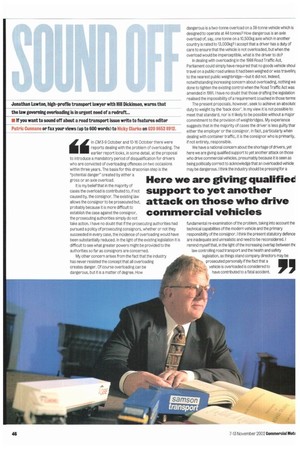Jonathan Lawton, high-profile transport lawyer with Nil Dickinson, warns that
Page 46

If you've noticed an error in this article please click here to report it so we can fix it.
the law governing overloading is in urgent need of a redraft_.
• if you want to sound off about a road transport issue write to features eater Patric Cunnane or fax your views (up to 600 words) to Micky Clarke on 020 8652 8912.
id In CM3-9 October and 10-16 October there were
reports dealing with the problem of overloading. The earlier report looks, in some detail, at the proposal to introduce a mandatory period of disqualification for drivers who are convicted of overloading offences on two occasions within three years. The basis for this draconian step is the "potential danger" created by either a gross or an axle overload.
It is my belief that in the majority of cases the overload is contributed to, if not caused by, the consignor. The existing law allows the consignor to be prosecuted but, probably because it is more difficult to establish the case against the consignor, the prosecuting authorities simply do not take action. I have no doubt that if the prosecuting authorities had pursued a policy of prosecuting consignors, whether or not they succeeded in every case, the incidence of overloading would have been substantially reduced. In the light of the existing legislation it is difficult to see what greater powers might be provided to the authorities so far as consignors are concerned. dangerous is a two-tonne overload on a 38-tonne vehicle which is designed to operate at 4-4 tonnes? How dangerous is an axle overload of, say, one tonne on a 10,500kg axle which in another country is rated to 13,000kgP I accept that a driver has a duty of care to ensure that the vehicle is not overloaded, but when the overload would be imperceptible, what is the driver to do?
In dealing with overloading in the 1988 Road Traffic Act, Parliament could simply have required that no goods vehicle shoul travel on a public road unless it had been weighed or was travellinj to the nearest public weighbridge—but it did not. Indeed, notwithstanding Increasing concern about overloading, nothing wa done to tighten the existing control when the Road Traffic Act was amended in 1991.1 have no doubt that those drafting the legislation realised the impossibility of a requirement couched in those terms The present proposals, however, seek to achieve an absolutE duty to weight by the 'back door'. In my view it is not possible to meet that standard, nor is it likely to be possible without a major commitment to the provision of weighbridges. My experience suggests that in the majority of cases the driver is less guilty thar either the employer or the consignor. In fact, particularly when dealing with container traffic, it is the consignor who is primarily, if not entirely, responsible.
We have a national concern about the shortage of drivers, yet here we are giving qualified support to yet another attack on those who drive commercial vehicles, presumably because it is seen as being politically correct to acknowledge that an overloaded vehicle may be dangerous. I think the Industry should be pressing for a
fundamental re-examlnation of the problem, taking into account the technical capabilities of the modern vehicle and the primary responsibility of the consignor. I think the present statutory defence are inadequate and unrealistic and need to be reconsidered. I remind myself that. in the light of the increasing overlap between thE
law controlling road transport and the health and safety legislation, as things stand company directors may be prosecuted personally if the fact that a vehicle is overloaded is considered to have contributed to a fatal accident.




























































































































































